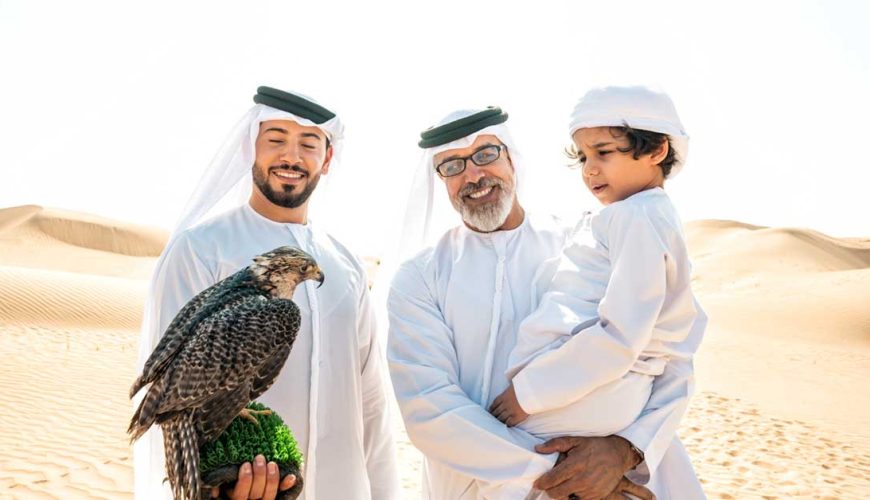The History of the UAE: From Desert Tribes to Global Hub
The UAE’s journey from a land of desert tribes to one of the world’s leading global hubs is extraordinary. What was once a region defined by Bedouin culture, pearl diving, and trade routes is now known for its skyscrapers, cutting-edge technology, and economic power. This transformation offers a fascinating insight into the UAE’s cultural heritage and the visionary leadership that turned it into a thriving modern nation. Understanding the UAE’s history provides a unique perspective on this remarkable nation’s rich culture and rapid growth. For tourists and residents, this journey reveals the UAE’s evolution from humble beginnings to a dynamic player on the world stage. This deep-rooted heritage, influenced by its Bedouin past, pearl diving economy, and strategic trade position, is critical to appreciating the UAE’s distinct identity and modern achievements. 1. Ancient Roots and Tribal Life The UAE’s history stretches back thousands of years, with archaeological evidence showing early human settlements in the region. The Bedouin tribes, known for their resilience and adaptability to the harsh desert environment, played a central role in shaping Emirati culture. Key Figures & Events: Early tribal leaders who maintained social structures and trade. Cultural Impact: Bedouin customs, hospitality values, and traditions like falconry and camel herding are still part of the UAE’s identity today. Significance: The ancient lifestyle highlights the resourcefulness and unity that defined early Emirati society. 2. The Rise of Pearling and Maritime Trade Pearling became one of the most significant industries in the UAE during the late 19th and early 20th centuries, providing income and international trade connections. Economic Importance: The wealth from pearl diving transformed coastal communities and laid the foundation for trade with other Gulf nations. Cultural Impact: Pearl diving fostered a unique maritime culture and promoted community unity. Significance: This era contributed to the UAE’s future role as a trading hub and is still celebrated in the country’s cultural festivals. 3. The Influence of the British Empire In the early 19th century, the British Empire established treaties with the Trucial States (now the UAE) to secure peace and safe passage for their trade routes. Key Events: The Trucial States treaties of 1820 and the 1892 protectorate agreement. Impact on Governance: These treaties offered protection while setting the foundation for structured governance, leading to improved stability. Significance: The British influence helped to unify the region and pave the way for modern infrastructure and governance in the UAE. 4. Discovery of Oil and Economic Transformation The discovery of oil in the 1950s marked a pivotal point for the UAE. Revenue from oil exports led to an unprecedented economic transformation, funding infrastructure, healthcare, and education. Key Figures: Sheikh Zayed bin Sultan Al Nahyan envisioned a future built on tradition and modernization. Impact on Society: Rapid urbanization, improved quality of life, and access to modern amenities. Significance: Oil wealth catalyzed the UAE’s development, creating the foundation for its status as a prosperous nation. 5. Unification of the Emirates (1971) On December 2, 1971, the United Arab Emirates was established as a federation of seven emirates under the leadership of Sheikh Zayed bin Sultan Al Nahyan. This unification provided stability and a shared vision for growth. Key Event: The signing of the union agreement, which marked the official birth of the UAE. Impact on Identity: Created a solid national identity rooted in Islamic values and Emirati heritage. Significance: Unification transformed the UAE into a model of cooperation, resilience, and progress, inspiring its development. 6. Modern Growth and Global Influence Today, the UAE is a global business, tourism, and innovation hub. Dubai and Abu Dhabi have emerged as international destinations known for their iconic skyscrapers, cultural attractions, and technological advancements. Key Milestones include Dubai’s Burj Khalifa, Expo 2020, Abu Dhabi’s Louvre Museum, and the UAE’s space exploration program. Impact on the Global Stage: The UAE is a forward-looking nation committed to sustainability, innovation, and cultural preservation. Significance: The UAE’s success story has set a benchmark for rapid development and demonstrates how strategic vision can transform a nation. Conclusion The UAE’s history is a journey of resilience, unity, and vision, from its early days of tribal life and pearl diving to its modern status as a global powerhouse. Each period has contributed to the nation’s unique identity and world presence. To truly understand the UAE, explore its cultural and historical sites and connect with the stories of its people. For a more profound experience, consider our client’s guided tours and services to bring the UAE’s vibrant history to life.
Cultural Etiquette in the UAE: What Every Tourist Should Know
Visiting the UAE offers a unique opportunity to experience a blend of modern luxury and rich cultural traditions. However, for many international tourists, understanding the local customs and etiquette can be a new and essential part of the travel experience. This guide will walk you through the critical aspects of cultural etiquette in the UAE, helping you navigate your visit with respect and appreciation for local traditions. Understanding and respecting cultural etiquette in the UAE is not just about following rules but enhancing your travel experience. The UAE has deep-rooted traditions, many of which are influenced by Islamic culture. Being mindful of these customs, especially for first-time visitors, can help avoid misunderstandings and show respect for the local way of life. Whether exploring the iconic cities of Dubai and Abu Dhabi or visiting more traditional areas, following the proper etiquette will ensure you leave a positive impression. 1. Dress Code in the UAE The UAE has a modest dress code, which is especially important in public places, mosques, and traditional areas. While the dress code is relaxed in tourist-heavy spots, such as resorts and beaches, it’s essential to be respectful in more conservative environments. For Women: Modest clothing that covers the shoulders and knees is expected, particularly in public spaces and religious sites. Headscarves are typically required when visiting mosques. For Men: Men should avoid wearing sleeveless shirts in public. In mosques or religious areas, long trousers and modest shirts are preferred. Tourist Tip: When visiting mosques, both men and women should wear modest attire, and women should cover their hair. 2. Greetings and Communication In the UAE, greetings are warm but often formal, especially when meeting someone for the first time. Handshakes: A standard greeting is a handshake, but it’s important to note that in some cases, men and women may not shake hands, especially in traditional settings. Wait for the other person to offer a hand first. Common Phrases: “As-Salaam-Alaikum” (peace be upon you) is a common and respectful greeting, with “Wa-Alaikum-Salaam” as the response. Public Displays of Affection: Public displays of affection, such as kissing and hugging, are considered inappropriate in public settings. Tourist Tip: When addressing someone, using titles like “Sheikh” or “Sayed” for men and “Sheikha” or “Sayeda” for women is a sign of respect. 3. Public Behavior Public behavior in the UAE should always be respectful. The country values calm, polite interactions, and certain behaviors are strictly prohibited. Swearing and Loud Behavior: Swearing, shouting, or engaging in loud, aggressive behavior can result in fines or legal consequences. Public Displays of Affection: Holding hands may be acceptable for married couples, but anything more, such as kissing, is generally frowned upon in public spaces. Littering: Littering is not only frowned upon but can lead to hefty fines. Tourist Tip: Maintaining a calm demeanor in public settings is key to respecting local customs. 4. Respect for Religion Islam is the official religion of the UAE, and understanding Islamic customs is crucial for respectful travel. Prayer Times: Muslims pray five times a day, and visitors may hear the call to prayer throughout the day. It’s respectful to avoid loud activities during this time, particularly near mosques. Ramadan: During the holy month of Ramadan, Muslims fast from dawn until sunset. While tourists are not required to fast, eating, drinking, or smoking in public during daylight hours is prohibited. Visiting Mosques: Non-Muslims are welcome to visit many mosques, but it’s important to dress modestly and follow any guidelines provided. Shoes should be removed before entering prayer areas. Tourist Tip: If visiting during Ramadan, be mindful of the customs and explore the cultural iftar meals available after sunset. 5. Social Customs When visiting someone’s home or being hosted by locals, there are several social customs to keep in mind. Removing Shoes: It is customary to remove your shoes before entering someone’s home. Hospitality: UAE locals are known for their hospitality. If offered food or drink, it is polite to accept. Offering Gifts: When offering gifts, avoid alcohol or items made of pork, as these may be considered inappropriate. Tourist Tip: When accepting food or gifts, it is polite to use your right hand, as this is a cultural norm in many Arab countries. 6. Photography Photography is a wonderful way to capture your travel memories, but there are some important rules to follow in the UAE. Respecting Privacy: Avoid taking photos of people, particularly women, without their permission. This is considered highly disrespectful and may even result in legal action. Government Buildings and Military Sites: Photography of government, military, or strategic locations is prohibited. Tourist Tip: When in doubt, ask for permission before taking photos, especially in local markets or traditional areas. 7. Tipping and Financial Etiquette Tipping is not mandatory in the UAE but is appreciated in many service-based settings. Restaurants: A 10-15% tip is common in restaurants, especially for good service. Some restaurants may include a service charge in the bill, so check first. Taxis: Rounding up the fare or offering a small tip is appreciated by taxi drivers. Hotels: Porters and housekeeping staff often receive tips, usually a small amount in local currency. Tourist Tip: While tipping is not obligatory, offering a small tip for good service is a way to show appreciation. Conclusion: Understanding and following cultural etiquette in the UAE not only shows respect for local customs but also enhances your travel experience. From modest dressing and respectful greetings to mindful behavior in public and religious sites, these guidelines ensure that you can navigate the UAE’s rich cultural landscape with ease and grace. Familiarizing yourself with these customs before your trip will help you avoid misunderstandings and make your visit more enjoyable. Ready to explore the UAE? Contact our client’s travel services for expert guidance and assistance with your trip planning.



